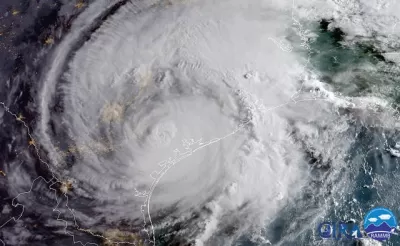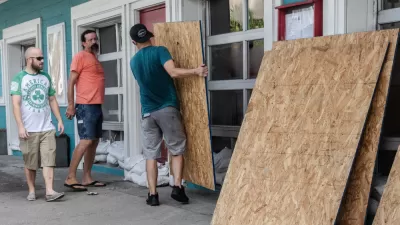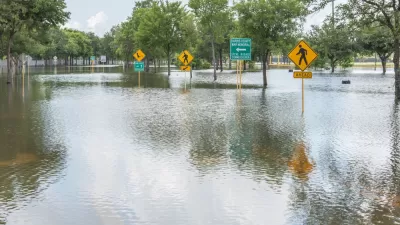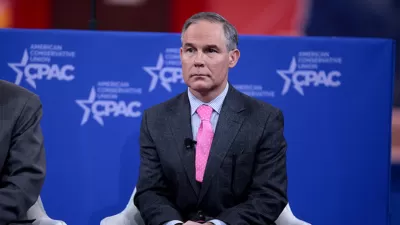A new study from MIT makes a clear connection between the intensity of rainfall caused by Hurricane Harvey last August in Texas and climate change, concluding that the likelihood of stronger downpours is greatly increasing.

"The extreme rains that inundated the Houston area during Hurricane Harvey were made more likely by climate change, a new study suggests, adding that such extreme flooding events will only become more frequent as the globe continues to warm," reports Chris Mooney, who writes about energy and the environment at The Washington Post, on Nov. 13.
The study, "Assessing the present and future probability of Hurricane Harvey’s rainfall," by MIT hurricane expert Kerry Emanuel, was published in the Proceedings of the National Academy of Sciences on Monday.
In the wake of Harvey, many researchers pointed out that a warmer atmosphere holds more water vapor and that, as a result, a warmer planet should see more extreme rains. But Emanuel’s study goes beyond this general statement to support the idea that the specific risk of such an extreme rain event is already rising because of how humans have changed the planet.
The study was based on climate modeling in the Houston area, measuring how much precipitation the simulations caused.
Emanuel conceded that precisely why the simulations changed the odds with greater global warming wasn’t clear — whether it had something to do with more water vapor or other storm characteristics. “This is left to future work,” he wrote.
The study is important to the rebuilding efforts in Houston, as Emanuel indicates as one of the reasons for his study, an confirmed by another expert.
“I guess what I was hoping to achieve was a little bit of a public service," states Emanuel. "There are folks down in Texas who are having to rebuild infrastructure, and I think they need to have some idea of what kind of event they’re building for.”
“The 20-fold future increase in the probability of Harvey-level rainfall points toward a markedly increasing vulnerability of Gulf Coast communities — one that they are not well prepared to adjust to,” added Greg Holland, a hurricane scientist at the National Center for Atmospheric Research.
While the study was focused on precipitation caused by Harvey and the probability of future hurricanes in Texas producing similar amounts of rain, Emanuel went further in a talk at MIT in September, just as Hurricane Maria made landfall in Puerto Rico, reports David L. Chandler for the MIT News Office on Sept. 21.
“Climate change, if unimpeded, will greatly increase the probability of extreme events,” such as the three record-breaking hurricanes of recent weeks, said Emanuel.
The most memorable part of Chandler's piece is Emanuel's jab at Environmental Protection Agency Administrator Scott Pruitt, who had dismissed any climate connection with the amount of rainfall from Hurricane Harvey.
Referring to....Pruitt’s recent comments that it was inappropriate to talk about climate change in relation to hurricanes Harvey and Irma, Emanuel wondered aloud “if after 9/11 he would have said that now is not a good time to talk about terrorism?”
Dr. Emanuel published "for the educated non-specialist:" Climate Science and Climate Risk: A Primer: [17-page pdf] in October 2016.
FULL STORY: Climate change upped the odds of Hurricane Harvey’s extreme rains, study finds

Trump Administration Could Effectively End Housing Voucher Program
Federal officials are eyeing major cuts to the Section 8 program that helps millions of low-income households pay rent.

Planetizen Federal Action Tracker
A weekly monitor of how Trump’s orders and actions are impacting planners and planning in America.

Canada vs. Kamala: Whose Liberal Housing Platform Comes Out on Top?
As Canada votes for a new Prime Minister, what can America learn from the leading liberal candidate of its neighbor to the north?

Washington State’s Parking Reform Law Could Unlock ‘Countless’ Acres for New Housing
A law that limits how much parking cities can require for residential amd commercial developments could lead to a construction boom.

Wildlife Rebounds After the Eaton Fire
Following the devastation of the Eaton Fire, the return of wildlife and the regrowth of native plants are offering powerful signs of resilience and renewal.

LA to Replace Inglewood Light Rail Project With Bus Shuttles
LA Metro says the change is in response to community engagement and that the new design will be ready before the 2028 Olympic Games.
Urban Design for Planners 1: Software Tools
This six-course series explores essential urban design concepts using open source software and equips planners with the tools they need to participate fully in the urban design process.
Planning for Universal Design
Learn the tools for implementing Universal Design in planning regulations.
Central Transportation Planning Staff/Boston Region MPO
Heyer Gruel & Associates PA
Institute for Housing and Urban Development Studies (IHS)
City of Grandview
Harvard GSD Executive Education
Regional Transportation Commission of Southern Nevada
Toledo-Lucas County Plan Commissions





























